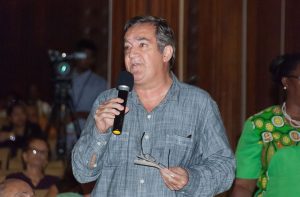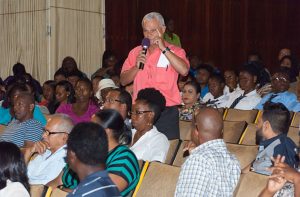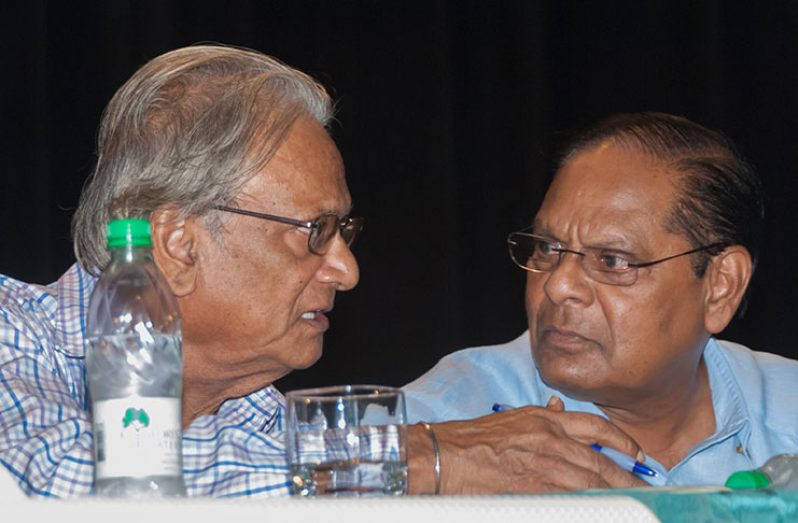GOVERNMENT has committed to review the value-added tax (VAT) on private tuition fees and a decision on the tax measure is likely to be made when Cabinet meets on Tuesday.
This was announced on Friday when Prime Minister Moses Nagamootoo and other government officials, including Minister of Education, Dr Rupert Roopnaraine and Minister of Public Telecommunications, Cathy Hughes, met with officials of private schools at the

National Culture Centre. Several private school students and their parents also attended the forum. Prime Minister Nagamootoo told the gathering that “it will be reviewed as well as other taxes,” adding that “but whether it will be reviewed for 2017, I cannot say that definitively, but for 2018 it is a possibility.” His comments did not go down well with some in the audience, who were obviously hoping for a more definitive position on the withdrawal of the tax.
Director of Public Information, Imran Khan, told the Guyana Chronicle that the comments of the Prime Minister were made in his personal capacity. He said that the Prime Minister cannot pronounce definitively on the 2017 budget tax measure being repealed, since that decision rests on Cabinet’s approval.
Minister Hughes, who moderated the session, told the gathering that the report of the meeting will be taken to Cabinet and specific responses will be made based on the discussions of the government. The Prime Minister during his address told the gathering that, after listening to the comments from those in attendance, that it is an “unusual measure” to impose a tax on private fees for private tuition. He made mention of the issues raised during the meeting, including the regularization and non-payment of taxes by some schools. ”It is for me unacceptable that 80% of the schools that consider themselves to be private schools are not even registered with the Ministry of Education.”

He said that a good state and good government have a duty to protect citizens from “overnight, mushrooming bottom-house schools”, which do not comply with the law and the standards of education. He clarified that his comments did not justify the tax measure for those which are tax-compliant but rather, he illustrated the considerations made by the government regarding the tax measure. The Prime Minister acknowledged that the tax measure was an “unpopular” tax which has been criticized and which resulted in a petition and protest and that as a caring government, it was duty bound to listen and review and committed that this will be done.
He said that in the first 20 months of the government, a sum of $70B was allocated to the education sector. “Education in our eyes and in our policy is an instrument of edification, enlightenment and liberation,” he said.
Roopnaraine during his address to the gathering acknowledged that the private education sector provides support to the public education sector, but that the large number of unregistered private schools needs to be addressed and regularised.
The Education Minister outlined that government was committed to investing heavily in education with a 2017 budget allocation of $43.1B which translates to 17.2% of the national budget. He noted that the education sector received the largest single budget allocation for 2017 and outlined that significant sums were being expended for the school-feeding and school uniform programmes, along with construction, expansion and renovation of schools, dormitories and other buildings.

During the forum, several parents, students and educators presented arguments from the floor and provided reasons why they believe the VAT measure should be repealed. Dr Brian O’Toole, head of Nations University, told the gathering that 15,000 persons signed a petition several weeks ago on the taxation measure and this was later sent to the government. He said that there was no response to the petition from the authorities until Friday’s forum. He said the government should go after the schools which are not tax-compliant, as he called for a level playing field.
O’Toole said the solution to the issue is “not to punish who pay tax,” but to go after those who are not compliant. He said that 12% of students pursuing the American Business Executive (ABE) programme at Nations have already dropped out of the programme in light of the increased fees which were made following implementation of the VAT measure. Stacy French of Mae’s School called on the government to explain what factors were considered in a $2B figure, which the authorities noted private schools have attained from tuition.
Chartered Accountant, Christopher Ram, also supported comments made by others that the authorities should go after the non-compliant schools. Ram said that he has known officials of the government including the Prime Minister for some time and that they each value the education sector. “I am sure that this government is sympathetic, I am sure that it is listening,” he said, as he called on the government officials to vindicate his confidence he holds in them.
The tax measure has created unease in the public domain since Minister of Finance, Winston Jordan, made the announcement last December during his presentation of the 2017 national budget. Following the removal of the zero-rated items in the 2017 budget, private institutions are required to pay 14 per cent tax which became effective from February 1, 2017. However, some private institutions which fall under the category of “Charter Schools” are not required to pay this levy.



.jpg)








